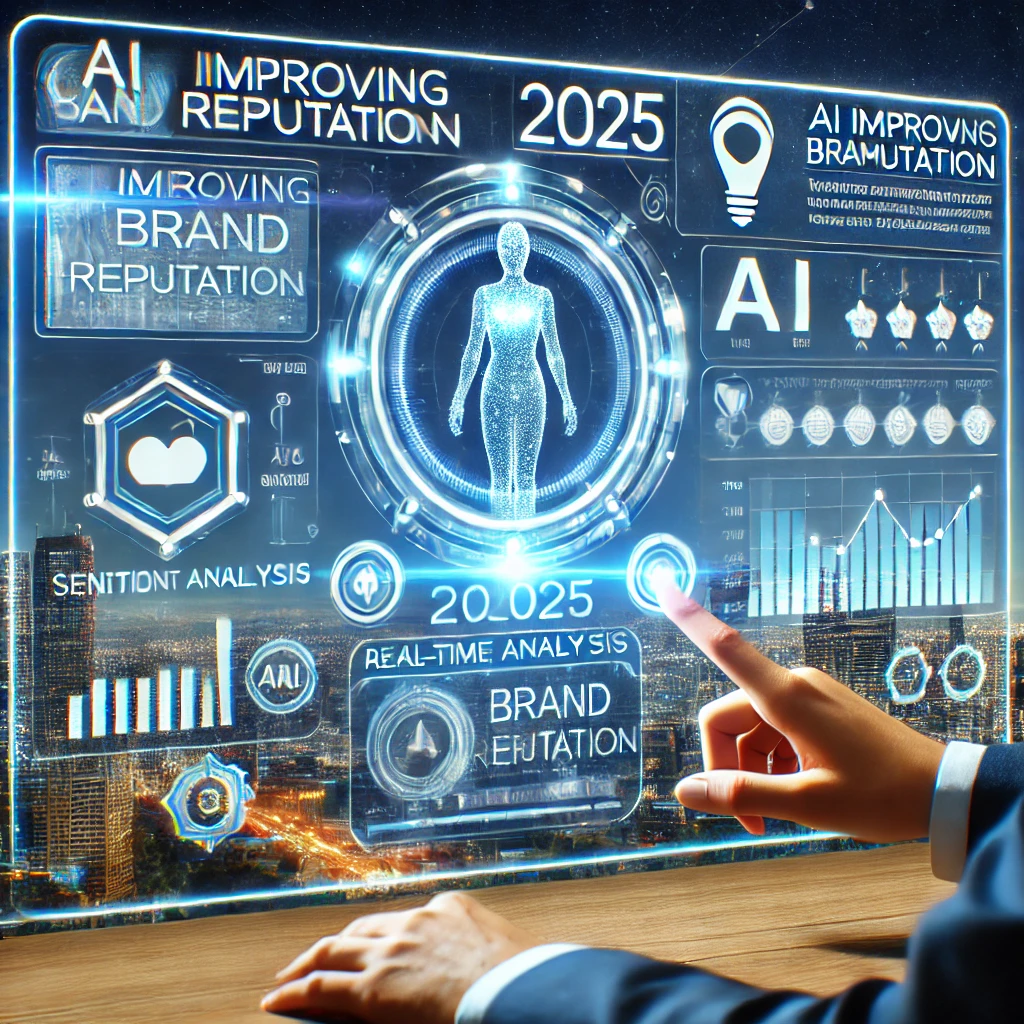In today’s fast-paced digital landscape, brand reputation is more crucial than ever. Consumers have access to an overwhelming amount of information, and a single misstep can tarnish a brand’s image almost instantly. However, artificial intelligence (AI) is revolutionizing reputation management, helping businesses monitor, predict, and improve their brand perception effectively. As we move through 2025, leveraging AI to enhance brand reputation is not just a competitive advantage but a necessity.
Understanding AI’s Role in Brand Reputation
AI plays a vital role in automating and optimizing reputation management strategies. By leveraging AI-powered tools, businesses can gain deep insights into consumer sentiment, enhance customer experiences, and mitigate potential crises before they escalate. AI can monitor brand mentions across digital platforms, analyze feedback patterns, and provide actionable insights to strengthen trust and credibility.
1. AI-Powered Sentiment Analysis
One of the most powerful applications of AI in reputation management is sentiment analysis. AI-driven sentiment analysis tools can scan millions of online conversations, reviews, and social media comments to determine how people feel about a brand. Using natural language processing (NLP) and machine learning, these tools classify feedback as positive, neutral, or negative.
How It Helps:
- Identifies trends in customer feedback, allowing brands to address concerns proactively.
- Helps companies tailor their marketing messages based on real-time sentiment.
- Enables quick responses to negative feedback before it escalates into a crisis.
2. AI-Driven Chatbots for Enhanced Customer Service
Customer service plays a significant role in brand perception. AI-powered chatbots and virtual assistants can handle customer inquiries promptly, providing instant support and reducing wait times. Advanced AI chatbots use deep learning to understand customer intent, allowing for more natural and effective interactions.
Benefits:
- Provides 24/7 customer support, ensuring consistent and timely responses.
- Reduces human workload, allowing customer service teams to focus on complex issues.
- Enhances customer satisfaction by resolving concerns quickly and efficiently.
3. Crisis Detection and Management
AI can act as an early warning system by identifying potential PR crises before they escalate. AI-powered monitoring tools can detect unusual spikes in negative sentiment, track industry trends, and flag problematic content in real time. By analyzing these patterns, brands can take immediate corrective actions to prevent reputational damage.
Key Advantages:
- Detects crises at their inception, allowing for swift intervention.
- Recommends strategic responses based on past successful crisis management cases.
- Prevents misinformation from spreading by providing verified, accurate responses.
4. AI-Powered Content Moderation
Brand reputation can suffer from negative or inappropriate content associated with the business. AI-driven content moderation tools help brands manage their online presence by automatically filtering out harmful or offensive comments on websites, social media, and forums.
Why It Matters:
- Maintains a positive and professional brand image by eliminating harmful content.
- Protects brand credibility by reducing exposure to false information or offensive discussions.
- Helps ensure that brand messages align with company values and ethics.
5. Predictive Analytics for Reputation Management
AI is not just about reacting to reputation threats—it can also predict potential issues before they arise. Predictive analytics uses AI-driven algorithms to analyze historical data, consumer trends, and online discussions to foresee potential risks to a brand’s reputation.
Use Cases:
- Helps businesses prepare crisis management strategies in advance.
- Identifies emerging trends that may impact brand perception.
- Enables proactive reputation-building efforts based on forecasted consumer sentiment.
6. Personalized Marketing Strategies
AI can enhance brand reputation by personalizing marketing efforts. AI-driven recommendation engines analyze customer data to create tailored experiences, ensuring that brands engage with consumers in meaningful and relevant ways.
Benefits:
- Increases customer engagement by delivering highly relevant content and offers.
- Enhances brand loyalty by making customers feel understood and valued.
- Improves conversion rates through AI-optimized marketing strategies.
7. AI-Based Competitive Analysis
Understanding how competitors are perceived in the market can help businesses refine their reputation management strategies. AI-powered tools can monitor competitor mentions, analyze customer sentiment, and provide insights into industry benchmarks.
Strategic Advantages:
- Helps brands differentiate themselves by identifying unique value propositions.
- Provides insights into competitor missteps to avoid similar mistakes.
- Assists in crafting data-driven marketing and branding strategies.
8. Automated Reputation Management Platforms
AI-driven reputation management platforms integrate various tools into a single dashboard, enabling brands to monitor online conversations, respond to customer concerns, and analyze brand perception in real time. These platforms leverage machine learning to provide recommendations on how to improve reputation effectively.
Features:
- Real-time tracking of brand mentions across multiple platforms.
- AI-driven response suggestions for managing customer interactions.
- Sentiment analysis dashboards for a comprehensive view of brand perception.
The Future of AI in Brand Reputation Management
As AI continues to evolve, its applications in brand reputation management will become even more sophisticated. Here are some emerging trends to watch for in 2025 and beyond:
- Hyper-Personalization: AI will refine customer experiences with even more precise personalization, strengthening brand loyalty.
- AI Ethics & Transparency: Brands will focus on ethical AI practices to build trust and credibility.
- Advanced Deepfake Detection: AI tools will become crucial in identifying and mitigating deepfake-related reputation threats.
- AI-Powered Video Analysis: Video content will be analyzed for brand sentiment, helping businesses understand their visual reputation.
Conclusion
AI is transforming how brands manage and enhance their reputation in 2025. By leveraging AI-powered sentiment analysis, predictive analytics, chatbots, content moderation, and competitive intelligence, businesses can proactively build and maintain a strong brand image. As AI technology advances, companies that integrate AI-driven reputation management strategies will not only protect their brands but also foster deeper customer trust and loyalty. Embracing AI is no longer optional—it is the key to sustaining a positive brand reputation in an increasingly digital world.

